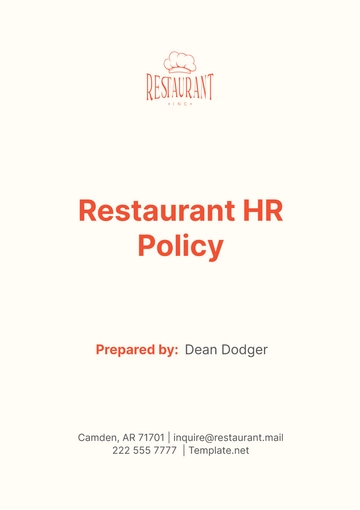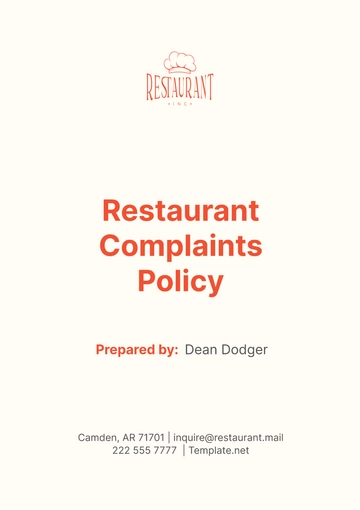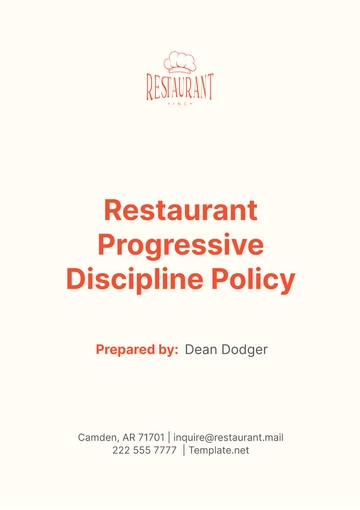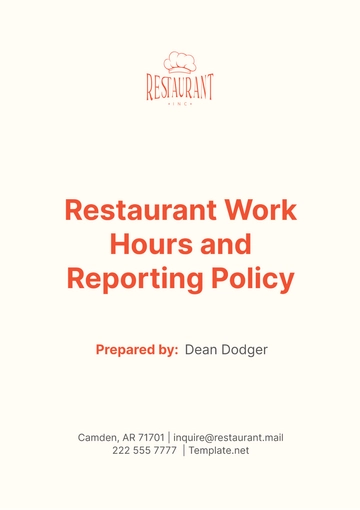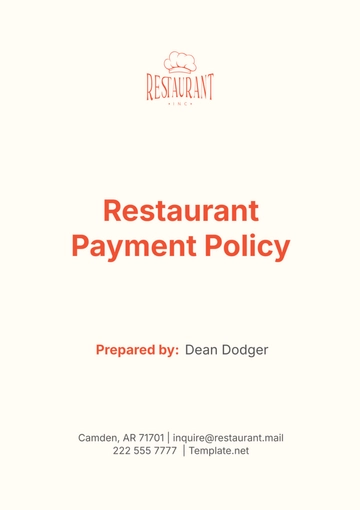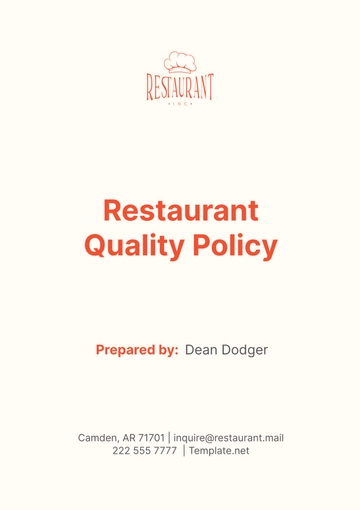Free Restaurant Overtime Policy
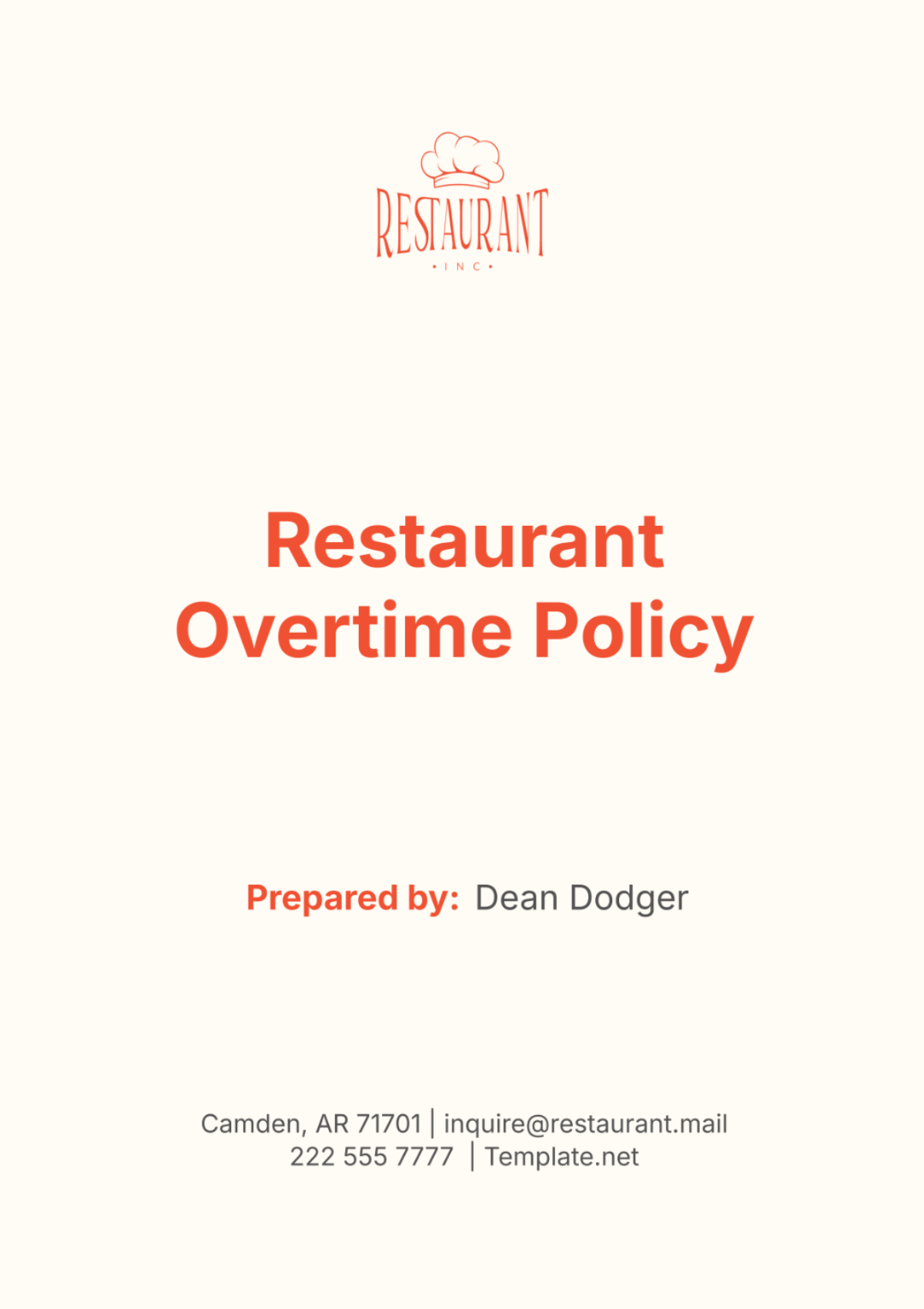
Effective Date: January 1, 2050
Reviewed By: [Your Name]
For: [Your Company Name]
1. Introduction
The purpose of this Restaurant Overtime Policy is to provide clear guidelines on the management, approval, and compensation for overtime work in our restaurant. This policy aims to ensure that all employees are treated fairly and that overtime work is managed efficiently and in compliance with legal requirements. By adhering to this policy, [Your Company Name] strives to maintain a balanced workload for employees while meeting operational demands.
2. Scope
This policy applies to all employees of [Your Company Name], regardless of their role or employment status. It covers the procedures for approving, recording, and compensating overtime work. This includes full-time, part-time, and temporary staff across all departments. The policy ensures that all employees, whether kitchen staff, servers, administrative personnel, or management, are aware of the processes involved in working overtime and receiving appropriate compensation.
2.1 Applicability
The policy is relevant to all roles within the restaurant, from front-of-house staff such as hosts and servers to back-of-house staff including cooks and dishwashers, as well as administrative and support staff. This ensures uniformity in handling overtime across the entire organization.
2.2 Inclusive of All Employment Types
Both permanent and temporary employees, whether they are full-time or part-time, are included in the scope of this policy. This broad applicability ensures that every employee is covered under the same guidelines and can expect fair treatment when it comes to overtime work and compensation.
2.3 Departments Covered
The policy extends to all departments within the restaurant. This includes, but is not limited to, the kitchen, dining area, bar, and administrative offices. Each department is responsible for adhering to the guidelines set forth in this policy to ensure consistency and compliance.
3. Definitions
3.1 Overtime
Overtime refers to any hours worked beyond the standard workweek of 40 hours. It is crucial to recognize and appropriately compensate overtime to maintain fairness and legal compliance.
3.2 Employee
An employee is any individual employed by [Your Company Name], including full-time, part-time, and temporary staff. The term encompasses all individuals who contribute to the restaurant's operations.
3.3 Supervisor or Manager
A supervisor or manager is an individual responsible for overseeing employees and approving overtime work. Their role includes ensuring that overtime is necessary and appropriately authorized.
3.4 Overtime Request Form
The Overtime Request Form is a document that employees must complete and submit to request approval for overtime work. This form ensures that all overtime is documented and justified.
4. Overtime Approval
4.1 Pre-Approval Requirement
Overtime work must be pre-approved by a supervisor or manager to ensure that it is necessary and aligns with operational needs. Pre-approval helps in managing labor costs and ensuring that overtime is used efficiently.
4.2 Overtime Request Form
Employees are required to submit an Overtime Request Form, detailing the reason for the overtime and the expected duration. This form must be submitted to the relevant supervisor or manager in advance. The form serves as a formal record of the overtime request and facilitates the approval process.
4.3 Approval Discretion
Approval for overtime is at the discretion of management and will be based on factors such as workload, staffing levels, and budget constraints. This ensures that overtime is used judiciously and only when necessary.
4.4 Emergency Overtime
In exceptional cases where advance approval is not possible, employees must notify their supervisor or manager as soon as practicable and complete the Overtime Request Form retrospectively. This provision ensures that essential tasks can be completed even in unexpected situations.
5. Recording Overtime
5.1 Accurate Timesheet Maintenance
All approved overtime must be accurately recorded on the employee’s timesheet. This includes the date, start and end times, and total hours worked. Accurate recording is essential for proper compensation and legal compliance.
5.2 Employee Responsibility
Employees are responsible for ensuring their timesheets are up-to-date and reflect the actual hours worked, including any overtime. This accountability helps in maintaining accurate records and ensuring timely compensation.
5.3 Verification
Supervisors or managers must verify and approve the recorded overtime hours on the timesheet before it is submitted for payroll processing. Verification ensures that all recorded hours are accurate and authorized.
6. Compensation
6.1 Overtime Pay Rate
Employees will be compensated for overtime work at a rate of 1.5 times their regular hourly rate. This rate is in accordance with labor laws and ensures fair compensation for additional work.
6.2 Payroll Inclusion
Overtime payments will be included in the employee’s next regular paycheck following the approval and recording of the overtime hours. This ensures that employees receive timely compensation for their extra efforts.
6.3 Taxation
Overtime payments are subject to the same tax withholding requirements as regular wages. Employees should be aware that their overtime earnings will be taxed accordingly.
7. Compliance with Legal Requirements
7.1 Adherence to Laws
[Your Company Name] adheres to all applicable labor laws and regulations regarding overtime. Compliance with these laws is essential to avoid legal issues and ensure fair treatment of employees.
7.2 Policy Updates
Any changes to legal requirements will be promptly reflected in this policy to ensure continued compliance. Regular updates ensure that the policy remains current and legally sound.
7.3 Employee Rights
Employees will be informed of their rights and obligations concerning overtime through regular training and updates to this policy. Education on these rights helps in fostering a transparent and fair work environment.
8. Managerial Responsibilities
8.1 Monitoring Overtime
Managers are responsible for monitoring and managing overtime within their teams to ensure it is necessary and cost-effective. Effective monitoring helps in controlling labor costs and preventing abuse of overtime.
8.2 Preventing Excessive Overtime
Managers must ensure that employees are not overburdened by excessive overtime and that it does not lead to burnout or decreased productivity. Balancing workload is crucial for maintaining employee health and performance.
8.3 Budget Management
Managers must consider the budget implications of approving overtime and seek alternatives, such as adjusting schedules or hiring temporary staff, when appropriate. This helps in managing costs effectively.
9. Employee Responsibilities
9.1 Requesting Overtime
Employees are expected to request overtime only when necessary and to seek approval in advance. This ensures that overtime is planned and justified.
9.2 Time Management
Employees should manage their time efficiently during regular working hours to minimize the need for overtime. Effective time management helps in reducing reliance on overtime.
9.3 Reporting Issues
Employees should report any issues related to overtime, such as discrepancies in pay or approval, to their supervisor or Human Resources. Reporting issues promptly ensures they are addressed in a timely manner.
10. Policy Review
10.1 Annual Review
This policy will be reviewed annually or as needed to ensure it remains relevant and compliant with any changes in labor laws or business operations. Regular reviews help in maintaining the effectiveness of the policy.
10.2 Review Date
The next scheduled review date is January 1, 2051. Marking a review date ensures that the policy is periodically assessed and updated as necessary.
10.3 Policy Amendments
Any amendments to this policy will be communicated to all employees in a timely manner. Communication of changes ensures that all employees are aware of the latest guidelines and procedures.
11. Contact Information
11.1 Human Resources Contact
For any questions or further clarification regarding this policy, please contact Human Resources at [Your Company Email]. HR is the primary point of contact for policy-related inquiries.
11.2 Additional Contacts
Employees may also reach out to their immediate supervisor or manager for assistance with overtime-related issues. Having multiple points of contact ensures that employees can get the help they need promptly.
12. Appendix
(Include all relevant forms needed to implement this policy effectively. Providing these forms helps in standardizing the process and ensuring all necessary documentation is available).
- 100% Customizable, free editor
- Access 1 Million+ Templates, photo’s & graphics
- Download or share as a template
- Click and replace photos, graphics, text, backgrounds
- Resize, crop, AI write & more
- Access advanced editor
Ensure fairness and compliance in your restaurant's workforce management with Template.net's Restaurant Overtime Policy Template. Crafted with clarity and precision, this template sets clear guidelines for overtime eligibility, compensation, and procedures. With our AI editor tool, customization is effortless, allowing you to tailor the policy to your restaurant's unique needs and regulations. Streamline your HR processes and foster a productive work environment.
You may also like
- HR Policy
- Restaurant Policy
- Company Policy
- Accounting Policies and Procedures
- Website Policy
- Privacy Policy
- Safety Policy
- School Policy
- IT and Software Policy
- Law Firm Policy
- Construction Policy
- Interior Design Policy
- Travel Agency Policy
- Education Academic Policy
- Security Policy
- Real Estate Policy
- Expense Policy
- Software Policy








